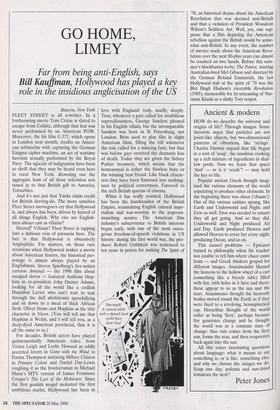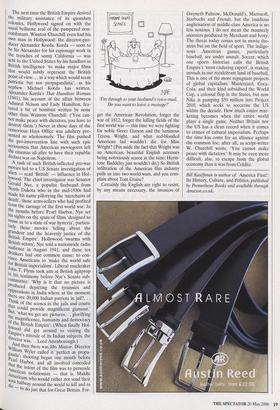GO HOME, LIMEY
Far from being anti-English, says
Bill Kauffman, Hollywood has played a key
role in the insidious anglicisation of the US
Batavia, New York FLEET STREET is all a-twitter. In a forthcoming movie Tom Cruise is slated to escape from Colditz, although that feat was never performed by an American POW. Moreover, the hit film U-571, which opens in London next month, credits an Ameri- can submarine with capturing the German Enigma cipher machine, an act of wartime heroism actually performed by the Royal Navy. The squeals of indignation have been so shrill that they may be heard even here in rural New York, drowning out the aggregate hum of all those television sets tuned in to that British gift to America, Teletubbies.
And it's not just that Yanks claim credit for British derring-do. The more sensitive Fleet Street moviegoers cry that Hollywood is, and always has been, driven by hatred of all things English. Why else are English- men always cast as villains?
Hatred? Villains? Fleet Street is tapping into a dubious vein of paranoia here. The fact is that Hollywood is obsessively Anglophilic. For starters, on those rare occasions when Hollywood makes a movie about American history, the historical per- sonage is almost always played by an Englishman. Steven Spielberg's live-action cartoon Amistad — the 1998 film about escaped slaves — featured Anthony Hop- kins as ex-president John Quincy Adams, looking for all the world like a codfish Hannibal Lecter who can't wait to tear through the dull abolitionist speechifying and sit down to a meal of thick African flesh. Oliver Stone cast Hopkins as the title character in Nixon. (You will tell me that Hopkins is Welsh, and I will tell you, as a deep-dyed American provincial, that it is all the same to us.) For decades, British actors have played quintessentially American roles: from Vivien Leigh and Leslie Howard as oddly accented lovers in Gone with the Wind to Emma Thompson imitating Hillary Clinton in Primary Colors and Daniel Day-Lewis roughing it as the frontiersman in Michael Mann's MTV version of James Fenimore Cooper's The Last of the Mohicans. Since the first goatish mogul molested the first ambitious starlet, Hollywood has been in love with England: truly, madly, deeply. True, whenever a part called for atrabilious superciliousness, George Sanders phoned in his English villain, but the incomparable Sanders was born in St Petersburg, not London. Brits used to play flits in slight American films, filling the bill whenever the role called for a mincing fairy, but that was before gays received the dramatic kiss of death. Today they are given the Sidney Poitier treament, which means that the homosexual is either the flawless bore or the winning best friend. Like black charac- ters they have been flattened into nothing- ness by political correctness. Farewell to the arch British queens of cinema.
When it has really counted, Hollywood has been the handmaiden of the British Empire, transmitting English cultural impe- rialism and war-worship to the popcorn- munching masses. The American film industry's subservience to British interests began early, with one of the most outra- geous freedom-of-speech violations in US history: during the first world war, the pro- ducer Robert Goldstein was sentenced to ten years in prison for making The Spirit of 76, an historical drama about the American Revolution that was deemed anti-British and thus a violation of President Woodrow Wilson's Sedition Act. Well, yes, one sup- poses that a film depicting the American rebellion against the British would be some- what anti-British. In any event, the number of movies made about the American Revo- lution over the next 80-plus years can almost be counted on two hands. Before this sum- mer's blockbuster-to-be, The Patriot, starring Australian-bred Mel Gibson and directed by the German Roland Emmerich, the last Hollywood stab at the spirit of '76 was the Brit Hugh Hudson's execrable Revolution (1985), memorable for its miscasting of Nas- tassia Kinski as a slinky Tory sexpot. The next time the British Empire desired the military assistance of its quondam colonies, Hollywood signed on with the usual bellicose zeal of the pampered non- combatant. Winston Churchill even had his own man in Hollywood: the director-pro- ducer Alexander Korda. Korda — soon to be Sir Alexander for his espionage work in the trenches of sunny California — was sent to the United States by his handlers in British intelligence 'to make major films that would subtly represent the British Point of view... in a way which would seem patriotic but not propagandistic', as his nephew Michael Korda has written. Alexander Korda's That Hamilton Woman (1941), his account of the affair between Admiral Nelson and Lady Hamilton, fea- tured a bit of bombast written by none other than Winston Churchill. (`You can- not make peace with dictators, you have to destroy them.') Never in those days of the censorious Hays Office was adultery pre- sented so wholesomely. The film pushed the pro-intervention line with such epic seriousness that American moviegoers left the cinemas all afire to have their republic declare war on Napoleon. A rash of such British-inflected pro-war movies led to a US Senate investigation of alien — read 'British' — influence in Hol- lywood. The chief investigator was Senator Gerald Nye, a populist firebrand from North Dakota who in the mid-1930s had made his name pillorying the 'merchants of death', those arms-sellers who had profited from the carnage of the first world war. In the months before Pearl Harbor, Nye set his sights on the spate of films 'designed to rouse us to a state of war hysteria', particu- larly those movies 'telling about the grandeur and the heavenly justice of the British Empire'. Hollywood 'swarms with British actors', Nye told a nationwide radio audience in August 1941, and these, tea drinkers had one common cause: to con- vince Americans to 'make the world safe for British imperialism'. Liberal muckraker John T. Flynn took aim at British agitprop In his testimony before Nye's Senate sub- committee: 'Why is it that no picture is Produced depicting the tyrannies and ePPressions in India where at the moment there are 20,000 Indian patriots in jail?.. . Think of the scenes in the jails and courts that could provide magnificent glamour.' But, 'what we get are pictures. . . glorifying the magnificence, humanity and democracy of the British Empire'. (When finally Hol- lywood did get around to visiting the 111Plre's misrule of its Indian subjects, the director was. . . Lord Attenborough.) William then there was Mrs Miniver. Director Wyler called it 'perfect as propa- tanda': shooting began one month before ha„earl Harbor, and all involved conceded the intent of the film was to persuade American isolationists — that is, Middle AM_ ericans who would rather not send their dins halfway around the world to kill and to — to do just that for Great Britain. For- `I'm through to your husband's voice-mail. Do you want to leave a message?'
get the American Revolution, forget the war of 1812, forget the killing fields of the first world war — this time we were fighting for noble Greer Garson and the luminous Teresa Wright, and what red-blooded American lad wouldn't die for Miss Wright? (Put aside the fact that Wright was an American, beautiful English actresses being notoriously scarce at the time; Herm- ione Baddeley just wouldn't do.) So British infiltration of the American film industry pulls us into two world wars, and you com- plain about Tom Cruise?
Certainly the English are right to resist, by any means necessary, the invasion of Gwyneth Paltrow, McDonald's, Microsoft, Starbucks and Friends, but the insidious anglicisation of middle-class America is no less noxious. I do not mean the mannerly snoozers produced by Merchant and Ivory. The threat today comes not in movie the- atres but on the field of sport. The indige- nous American games, particularly baseball, are under assault. Soccer, which one sports historian calls the British Empire's 'most enduring export', is making inroads in our recalcitrant land of baseball. This is one of the more repugnant projects of global capitalism: Mastercard, Coca- Cola, and their kind subsidised the World Cup, a colossal flop in the States, but now Nike is pumping $50 million into Project 2010, which seeks to soccerise the US within the decade. How much easier mar- keting becomes when the entire world plays a single game. Neither Britain nor the US has a clean record when it comes to crimes of cultural imperialism. Perhaps the time has come for an alliance against the common foe; after all, as script-writer W. Churchill wrote, 'You cannot make peace with dictators.' It may be even more difficult, alas, to escape from the global economy than it was from Colditz.
Bill Kauffman is author of America First!: Its History, Culture, and Politics, published by Prometheus Books and available through Amazon.co,uk.










































































 Previous page
Previous page